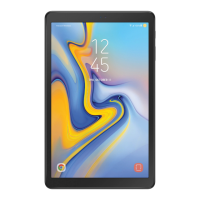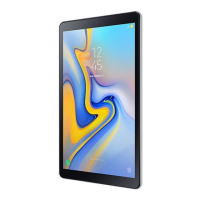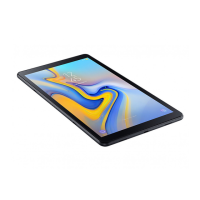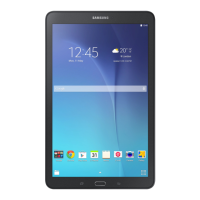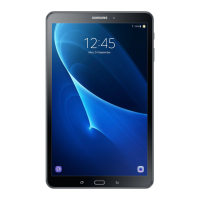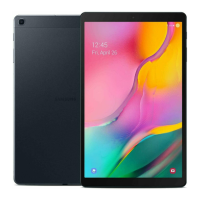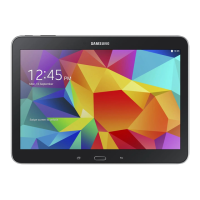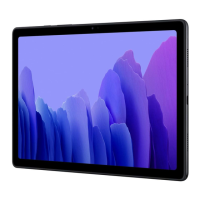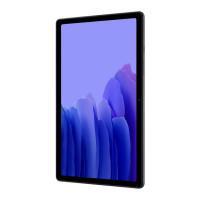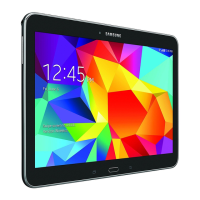Do you have a question about the Samsung SM-T597W and is the answer not in the manual?
Important initial information for safe and proper device use, covering default settings and content variations.
Explains the meaning of warning, caution, and notice icons used in the manual for user guidance.
Describes situations where the device may overheat during charging and solutions.
Explains why the device might heat up during normal operation and provides steps to mitigate it.
Details how overheating affects device performance and potential automatic shutdowns.
Advises on avoiding extreme temperatures and environments to prevent device heating.
Lists items included in the device package and accessory information.
Illustrates the physical components and ports of the device with labels for identification.
Warns about magnets, speaker usage, and potential issues from screen protectors.
Explains the function of physical keys and on-screen navigation buttons.
Details the S Pen's parts and their respective functions for device interaction.
Provides step-by-step instructions for replacing a worn S Pen nib.
Guides users on how to charge the device's battery, including safety precautions.
Offers tips and options to conserve the device's battery power for longer usage.
Provides essential tips and safety warnings related to charging the device's battery.
Explains the built-in fast charging capability and how to activate it.
Instructions on inserting the nano-SIM card into the device for network connectivity.
Detailed visual steps for correctly installing the SIM or USIM card into the tray.
Provides instructions on how to safely remove the SIM or USIM card from the device.
Guides on how to insert a microSD card for expanded storage, including compatibility.
Visual steps for correctly inserting the memory card into the tray.
Instructions on how to unmount and safely remove the memory card from the device.
Explains how to format a memory card for use with the device, including backup advice.
Instructions on how to power the device on, off, and restart it for various situations.
Guides the user through the initial setup process, including language and Wi-Fi connection.
Instructions for signing into a Samsung account to access services and sync data.
Final steps of the initial setup, including setting screen lock and home screen appearance.
Explains the benefits and services provided by a Samsung account.
Step-by-step guide to creating a new Samsung account directly on the device.
Instructions for logging into an existing Samsung account on the device.
Steps to remove a registered Samsung account and its associated data from the device.
How to transfer data from an old device using Samsung Cloud or Smart Switch.
Details on using the Smart Switch app for transferring data between devices.
Explains wireless data transfer between devices using Wi-Fi Direct technology.
Step-by-step guide for performing data transfer using the Smart Switch application.
How to transfer data to or from the device using external storage like a microSD card.
Instructions for backing up device data to a computer using Smart Switch.
Information on how to access and view data that has been imported to the device.
How to back up device data to Samsung Cloud for safekeeping and recovery.
Steps to restore backed-up data from Samsung Cloud to the device.
How to sync device data with Samsung Cloud for access across multiple devices.
How to view stored items, usage status, and backup data within Samsung Cloud.
Guidelines for proper interaction with the touchscreen to prevent damage and ensure functionality.
Explains basic touchscreen interactions like tapping and tapping and holding.
Details how to use the dragging gesture on the touchscreen for various actions.
Explains the double-tap gesture for activating features or functions.
Describes how to use swiping gestures for navigation and interaction.
Explains how to use pinch and spread gestures for zooming on the screen.
Details the functions of the on-screen navigation buttons like Home, Back, and Recents.
How to show or hide the navigation bar for different viewing experiences.
Options to customize the navigation bar's appearance and button layout.
Explains the structure and elements of the device's home and app screens.
How to navigate between the home screen and the screen displaying all installed apps.
Instructions on how to move icons, widgets, and folders on the home screen.
Guides on how to create folders to group and organize apps on the home screen.
How to add more apps to existing folders and move apps out of folders.
Instructions on how to delete app folders and manage the apps within them.
How to customize wallpapers, add widgets, and manage home screen panels.
Option to display all apps directly on the home screen instead of a separate app screen.
A list and explanation of common icons displayed in the device's status bar.
Explains how the lock screen works, how it activates, and how to unlock the device.
Details various screen lock methods like swipe, PIN, password, face, and iris recognition.
Explains multiple methods for capturing screenshots and available post-capture options.
How to open, view, and manage notifications using the notification panel.
How to activate features using quick setting buttons and customize their layout.
Explains the on-screen keyboard layout, input languages, and how to change keyboard types.
Covers advanced keyboard features like word prediction, emoticons, GIFs, and voice input.
Instructions on how to copy, cut, and paste text within and between applications.
How to look up word definitions directly from various applications.
How to download and install apps from the Samsung Galaxy Apps store.
How to download and install apps from the Google Play Store.
How to uninstall, disable, or enable applications on the device.
How to view and manage permissions granted to applications for accessing device features.
Explains how to access and use the Air Command menu for S Pen features.
How to customize the Air Command panel by adding shortcuts to frequently used apps or functions.
Describes specific S Pen features like Create note, Smart select, Screen write, etc.
How to activate, move, and manage the Air Command icon on the screen.
Step-by-step guide to creating notes using the S Pen via the Air Command panel.
How to select areas of content, extract text, and perform actions with Smart Select.
How to capture a portion of a video and save it as a GIF animation.
How to write or draw on screenshots and capture elongated pages.
Instructions on creating animated messages by recording actions with the S Pen.
How to change pen settings, color, and background images for live messages.
How to translate text on the screen using the S Pen and Air Command.
Explains how to use Bixby Vision for object recognition, search, and text translation.
How to preview content or information by hovering the S Pen over screen items.
How to use the S Pen button and drag to select multiple items or text.
How to quickly create memos by writing on the screen without turning it on.
Overview of Bixby's capabilities, including Bixby Home, Vision, and Reminders.
Steps to launch, register, and sign in to Bixby on the device.
How to access and navigate the Bixby Home screen to view personalized content.
Steps to open Bixby Home and swipe to view recommended content and options.
How to view and interact with content cards displayed on the Bixby Home screen.
How to pin, hide, or stop displaying cards on the Bixby Home screen.
How to add or delete apps to be displayed as cards on the Bixby Home screen.
Details Bixby Vision's ability to recognize objects and provide information like images, text, and QR codes.
Various methods to launch Bixby Vision for object recognition and information retrieval.
How to use Bixby Vision to translate text found in images or documents.
How to search for similar images online using Bixby Vision.
How to find information about nearby places using Bixby Vision's location recognition.
How to search for food-related information, recipes, and videos using Bixby Vision.
How to find information about wine by scanning wine labels with Bixby Vision.
How Bixby Vision can scan and interpret QR codes to access linked information.
Explains how to create reminders for tasks or events with time or location-based alerts.
Steps to start the Reminder app and set it up for first-time use.
Detailed instructions on creating reminders with specified times or locations.
How to view and respond to reminder notifications when they appear.
How to view the list of reminders, select one to edit, and set details like frequency and location.
How to mark reminders as complete and restore them later.
Instructions on how to delete individual or multiple reminders.
How to adjust settings for Bixby Home, including account, cards, and notifications.
Overview of the Phone app's purpose for making and receiving calls.
Step-by-step guide on how to dial numbers and initiate voice or video calls.
How to make calls directly from call logs or the contacts list.
Setting up and using speed dial numbers for faster calling.
Instructions on how to dial international numbers using the Phone app.
How to answer incoming calls, reject them, and send quick messages.
How to add phone numbers to the block list to prevent unwanted calls.
Available options during a voice call, such as volume, hold, mute, and keypad access.
Options available during a video call, including camera control, switch, and mute.
How to save phone numbers to contacts from the dialer or call history.
How to add tags to numbers without saving them as contacts for caller information.
Overview of managing contacts on the device.
Step-by-step guide to adding new contacts with their information.
How to import contact lists from other storage locations or files.
How to sync device contacts with online accounts like Samsung or Google.
Methods for searching contacts and sharing contact information with others.
How to save and share your profile information with contacts.
How to merge duplicate contacts and delete unwanted entries.
Overview of the Messages app for sending and viewing text and multimedia messages.
How to compose and send text messages and voice messages using the app.
How to view message threads, select contacts, and reply to messages.
How to block specific numbers or messages from being received.
How to customize notification sounds, display options, and set message reminders.
Overview of the Internet app for searching and browsing webpages.
How to enter web addresses, search, and navigate webpages using the browser.
How to activate and use secret mode for private browsing and managing tabs.
How to set passwords and iris lock methods for securing secret mode.
Guides on how to add and configure email accounts in the Email app.
Instructions for composing, sending, and reading emails within the app.
Basic introduction to the camera app and guidelines for responsible photography.
How to open and start using the camera application on the device.
How to take photos and record videos, including focus, brightness, and capture methods.
How to add a floating camera button for easier access during shooting.
How to assign functions like burst shot or GIF creation to the camera button.
How to use zoom gestures and lock focus/exposure for better photo and video quality.
How to add live stickers to photos and videos for fun effects.
Explains various shooting modes like Auto, Beauty, and Pro for different photography scenarios.
Details the specific features and usage of Auto, Beauty, and Pro camera modes.
How to capture wide panoramic photos and tips for best results.
How to capture and view panoramas that include motion effects.
How to use HDR mode to capture photos with enhanced detail in bright and dark areas.
How to use Food mode to capture food images with more vibrant and appealing colors.
How to record scenes as fast-motion videos using Hyperlapse mode.
How to use Sports mode for capturing clear photos of fast-moving subjects.
How to take self-portraits using the front camera and apply beauty effects.
How to modify facial features like skin tone and eye size before taking selfies.
How to use Selfie Focus mode to blur the background and highlight the subject.
How to adjust skin tone and color for better selfie results.
How to take wide-angle selfies to capture more people in the frame.
How to capture wide selfies that include motion effects.
How to adjust camera settings like filter effects, flash, metering, and frame rate.
Settings for the rear camera, including picture size, video size, and timer.
Settings for the front camera, including picture/video size, timer, and mirror image.
Common camera settings like edit modes, video stabilization, grid lines, and location tags.
Overview of the Gallery app for viewing and managing images and videos.
How to view images, access options, and create movies, GIFs, or collages.
Methods for searching images by category, keywords, or location.
How to play videos, control playback, and capture screen content.
How to view detailed file information, people tags, and auto-created content for media.
How to view albums, hide default albums, and show them again.
How the device creates stories from media and how to manually create them.
How to delete created stories from the Gallery.
How to sync images and videos with Samsung Cloud for backup and access.
How to delete single or multiple images and videos from the Gallery.
Explains how to run two apps simultaneously in split screen or pop-up view.
Step-by-step guide on how to activate and use the split screen multitasking feature.
Options for switching windows, closing apps, and adding app pairs to the home screen.
How to resize the windows in split screen view by dragging the divider.
How to minimize the split screen view and resume it later.
How to save frequently used app pairs to the home screen for quick launching.
How to open apps in a pop-up window for multitasking alongside other applications.
How to reposition pop-up windows on the screen by dragging their toolbars.
Information about the Samsung Members app for device support, diagnostics, and community interaction.
Overview of the Samsung Notes app for creating text, drawing, and inserting media.
Step-by-step guide to creating notes using text, S Pen, images, or voice recordings.
How to write or draw notes using the S Pen in handwriting mode.
How to customize pen type, thickness, and color for note-taking and drawing.
How to use different eraser types and tools to remove handwriting or drawings.
How to use the easy writing pad for more convenient handwriting input.
How to edit handwritten notes using selection, cutting, moving, and resizing options.
How to use various brushes and colors to paint within notes and share to PENUP.
How to insert images from camera/gallery and voice recordings into notes.
How to pin notes to the home screen for quick access and editing.
How to save a note as a reminder to be viewed or acted upon later.
How to delete notes from the Samsung Notes app.
Overview of PENUP as a social network for sharing S Pen artwork and tips.
How to post artwork created in Samsung Notes or other apps to PENUP.
How to share artwork from Gallery or other drawing apps to PENUP.
How to view artwork, add comments, set favorites, and download.
How to use the S Pen and colors to add your own colors to images in the app.
Overview of the Calendar app for managing schedules with events and tasks.
How to create new events in the Calendar app, including details and settings.
How to create and save tasks within the Calendar application.
How to sync calendar events and tasks with online accounts.
Explains Samsung Flow for connecting tablets and smartphones and sharing content.
Step-by-step guide to connecting your tablet and smartphone using Samsung Flow.
Overview of the My Files app for managing files stored on the device and cloud.
How to set, stop, and delete alarms using the Clock app.
How to create and delete clocks for different time zones using the World Clock feature.
How to use the stopwatch feature to time events and record lap times.
How to set and use the timer feature for specific durations.
How to perform calculations and use the unit conversion tool with the Calculator app.
Explains Game Launcher for organizing downloaded games and setting game modes.
How to activate, use, and remove games from the Game Launcher.
How to adjust performance modes (Save power, Normal, High) for games.
How to access and use the Game Tools panel for features like muting notifications and capturing screenshots.
How to enable 'No alerts during game' to minimize distractions while playing.
Overview of SmartThings for connecting and managing smart devices, TVs, and IoT products.
How to connect to nearby devices like Bluetooth headsets or wearable devices.
How to control and manage smart home appliances, TVs, and IoT products.
How to view the status and control connected devices within SmartThings.
How to group devices by location and create scenes for simultaneous control.
How to add custom locations and create scenes for controlling multiple devices.
How to set up automated actions based on time or device status.
How to configure device notifications from connected SmartThings devices.
How to share content like images via various methods using the device.
Information on Link Sharing and Share to Device features.
Explains Samsung DeX for using the tablet like a computer on a larger screen.
How to connect a Keyboard Cover and use the tablet in Samsung DeX stand-alone mode.
How to connect the tablet to an external display via HDMI for viewing on a large screen.
How to use the tablet as a touchpad to control the Samsung DeX screen.
Overview of the Samsung DeX interface, including taskbar, apps button, and status bar.
How to use the on-screen keyboard within the Samsung DeX environment.
How to answer calls from the tablet while using Samsung DeX on an external display.
How to switch between screen modes (e.g., screen mirroring) within Samsung DeX.
How to safely disconnect the tablet from the DeX Pad or external display.
Instructions for connecting the tablet to a TV or monitor using an HDMI cable and adapter.
How to search for information and browse webpages using the Chrome browser.
How to send and receive emails using the Gmail service.
How to find locations, search maps, and get location information using Google Maps.
How to discover, listen to, and share music, including cloud uploads.
How to purchase or rent videos like movies and TV programs.
How to store content in the cloud, access it, and share it with others using Google Drive.
How to watch, create, and share videos using the YouTube application.
How to search, manage, and edit photos and videos from various sources.
How to quickly search for items on the internet or the device.
How to make simple video calls using the Google Duo application.
Overview of the Settings app for customizing device personalization and options.
Explains settings for Wi-Fi, Bluetooth, tablet visibility, and data usage.
How to enable flight mode and configure mobile hotspot settings for sharing data.
Steps to connect to a Wi-Fi network, including selecting a network and entering a password.
How to connect devices directly via Wi-Fi without an access point using Wi-Fi Direct.
How to share data like images between devices using Wi-Fi Direct.
How to disconnect from devices previously connected via Wi-Fi Direct.
How to activate Bluetooth and pair the device with other Bluetooth-enabled devices.
How to share data like images with other devices using Bluetooth.
How to disconnect from paired Bluetooth devices.
How to reduce mobile data usage by preventing background app data transfer.
How to use the device as a mobile hotspot or tethering device to share its data connection.
Step-by-step guide to activating and configuring the mobile hotspot.
Options for nearby device scanning, printing, download booster, VPN, and Ethernet.
How to add printer plug-ins and print content from the device.
How to download large files faster using Wi-Fi and mobile networks simultaneously.
How to adjust sound modes, vibration, volume, and notification settings.
Settings for notification sounds, touch sounds, screen lock sounds, and charging sounds.
How to activate and select modes for Dolby Atmos surround sound for enhanced audio.
How to change notification settings for apps, including icon badges.
How to adjust brightness, auto brightness, blue light filter, font, and screen zoom.
How to activate and schedule the blue light filter to reduce eye strain.
How to select screen modes like Adaptive Display, AMOLED Cinema, or Basic.
How to adjust the color balance for optimal display appearance in Adaptive Display mode.
How to adjust Red, Green, or Blue color values individually for screen tone.
How to set up and preview a screensaver for when the device is charging or docked.
How to change the wallpaper for the home screen and the locked screen.
Introduction to advanced features like S Pen, Samsung DeX, Games, and Multi window.
Explains features like Easy Mute using palm gestures and Direct Share for content sharing.
Overview of the Device Maintenance feature for checking battery, storage, memory, and security status.
How to use the quick optimization feature to improve device performance.
How to check battery status and activate power saving modes (MID, MAX).
How to prevent apps from consuming battery power and manage battery settings.
How to check and manage device storage, including deleting files and apps.
How to check and manage device memory, including cleaning background apps.
How to check the device's security status and scan for malware.
How to view app usage, change notification/permission settings, and uninstall apps.
Settings for screen lock type, Smart Lock, clock style, FaceWidgets, and app shortcuts.
How to set up Smart Lock to automatically unlock the device based on trusted locations or devices.
Overview of biometric security options like Intelligent Scan, Face Recognition, and Iris Scanner.
How to check for security updates and allow installation from unknown sources.
Information on Samsung Pass for secure sign-ins and Secure Folder for private content.
Settings for app permission notifications and secure startup protection.
Options for encrypting SD card data and configuring other security settings.
How to use Intelligent Scan for unlocking the screen with face and irises.
Important precautions to follow when using Intelligent Scan for face and iris recognition.
Tips for better accuracy when registering face and iris data.
Step-by-step guide to registering face and iris data for biometric security.
How to delete registered face and iris data from the device.
How to unlock the device screen using face and iris recognition via Intelligent Scan.
How to set up and use face recognition to unlock the device screen.
Important precautions to consider when using face recognition for device security.
Tips for ensuring better results when registering your face for recognition.
Step-by-step guide for registering your face data for the face recognition feature.
How to delete registered face data from the device.
How to unlock the device screen using face recognition instead of other methods.
Explains how iris recognition works and its uses for authentication and security.
Important precautions to follow when using iris recognition, especially regarding eye protection.
Tips for better accuracy when registering iris data, including lighting and distance.
Step-by-step guide for registering your iris data for security purposes.
How to delete registered iris data from the device.
How to use registered iris data for identity verification and website sign-ins via Samsung Pass.
How to unlock the device screen using iris recognition instead of other methods.
How to register biometric data (irises) to Samsung Pass for secure sign-ins.
How to use Samsung Pass to verify your Samsung account password using biometrics.
How to use Samsung Pass for quick and secure sign-ins to websites.
How to use Samsung Pass for quick and secure sign-ins to supported applications.
How to view and manage websites and apps registered with Samsung Pass.
How to delete biometric data and sign-in information from Samsung Pass.
Explains Secure Folder's purpose for protecting private content and apps.
Step-by-step guide to setting up Secure Folder, including lock methods and account sign-in.
How to configure Secure Folder to automatically lock when not in use.
How to move photos, contacts, and other files into Secure Folder.
How to move content out of Secure Folder back to the default storage.
How to add new apps or remove existing apps from Secure Folder.
How to add Samsung and Google accounts for syncing with apps in Secure Folder.
How to hide the Secure Folder shortcut from the apps screen for added privacy.
How to back up Secure Folder content to Samsung Cloud for safekeeping.
How to restore backed-up Secure Folder data from Samsung Cloud.
How to uninstall Secure Folder, including steps to back up content first.
Options for syncing, backing up, and restoring data using Samsung Cloud and managing accounts.
Explains the different types of user accounts (Administrator, Guest, User).
Step-by-step guide to adding new user accounts to the device.
How to switch between different user accounts on the device.
How to delete user accounts or change their settings.
How to configure settings for features provided by Google services.
Overview of various accessibility settings for users with visual, hearing, or dexterity impairments.
Settings for language, input, date/time, report diagnostic info, marketing, and reset.
How to add and set new languages for the device's interface.
How to update the device's software via FOTA, including manual and automatic options.
Information about security updates and where to find model-specific details.
How to access the user manual within the device's settings.
How to view device status, legal info, software version, and battery information.
Solutions for common device problems like incorrect codes, network errors, and battery issues.
Troubleshooting steps for slow or unresponsive touchscreen behavior.
Solutions for device freezing, fatal errors, and forcing restarts.
How to restart the device or perform a factory data reset if problems persist.
Troubleshooting for issues like calls not connecting, no sound, or poor audio quality.
Solutions for cellular network disconnections and poor audio quality.
What it means when the battery icon is empty and the necessary action.
Troubleshooting steps for the battery not charging properly.
Reasons for faster battery depletion and solutions for camera app errors.
Explains factors affecting photo quality and common issues like noise or blur.
Troubleshooting steps for errors when opening or playing multimedia files.
Solutions for Bluetooth connection issues and performance malfunctions.
Troubleshooting steps for establishing a connection between the device and a computer.
Solutions for device not finding location and data storage issues.
Troubleshooting for insufficient storage space and the missing Apps button.
Solutions for the navigation bar or screen brightness bar not appearing.
Troubleshooting for Samsung Cloud not working or iris recognition failures.
Safety warnings and instructions regarding battery removal and service.
Information about RF energy exposure limits and the FCC's role in device safety.
Details on Specific Absorption Rate (SAR) and FCC compliance for RF exposure.
FDA's Q&A for consumers regarding RF exposure from wireless devices.
Explains the FDA's authority and role concerning the safety of wireless devices.
Summary of research findings on potential health effects of RF exposure from wireless devices.
Steps users can take to minimize their exposure to radio frequency energy.
Information regarding the safety of wireless device use by children.
Discusses whether hands-free kits reduce RF exposure risks.
Evaluates the effectiveness of accessories claiming to shield from RF radiation.
Discusses potential interference between wireless devices and medical equipment like pacemakers.
Essential tips for using wireless devices safely while driving a car.
Advises on potential RF signal interference with other electronic devices.
Precautions for users with pacemakers to avoid potential interference from wireless devices.
Information on potential interference between wireless devices and hearing aids.
Precautions for users of other personal medical devices regarding RF energy.
Restrictions on using the device in vehicles, posted facilities, and static-prone areas.
Warnings and instructions for using the device in potentially explosive environments, like refueling stations.
How to make emergency calls, including dialing numbers and ensuring device readiness.
Warnings about allowing children to play with the device due to potential risks.
FCC compliance statement, rules, and cautions regarding device operation and interference.
Detailed FCC compliance information and measures to correct interference.
General safety cautions regarding device handling, accessories, and environmental factors.
Tips for improving signal reception quality for calls and data.
How the power save feature activates automatically when the device has no signal.
Guidelines for maintaining peak performance and proper operation of the device and accessories.
Information on network dependency, additional charges, and availability of features/ringtones.
Factors affecting battery standby and talk times, such as network configuration and usage patterns.
Important precautions for battery usage, charging, temperature, and disposal.
Guidelines for keeping the device clean, dry, and protected from damage.
